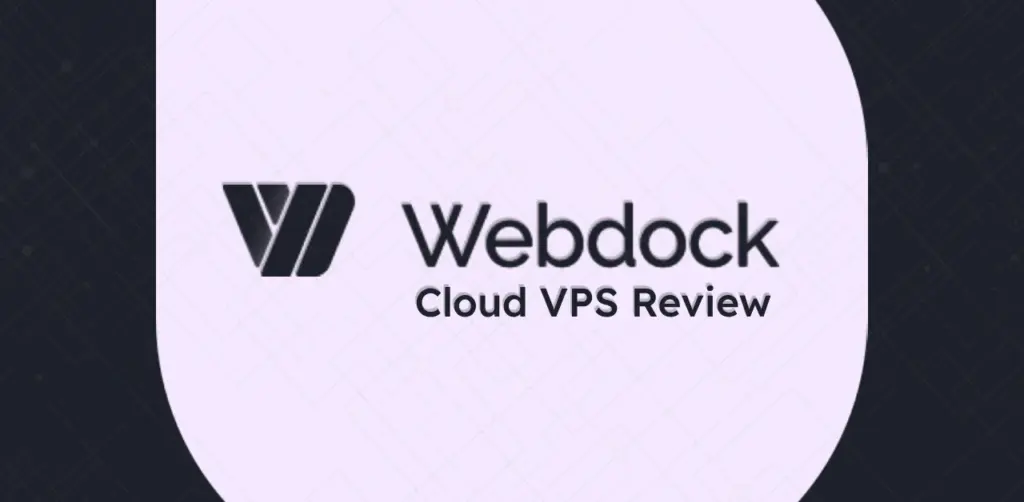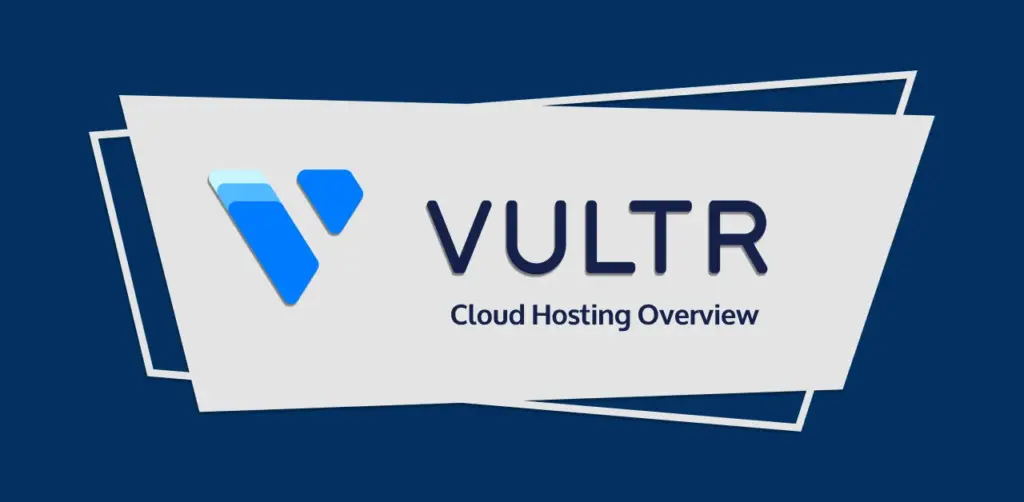If you’re setting up unmanaged servers for WordPress or PHP apps, you’ll probably use a control panel to set things up. The best WordPress cloud hosting control panels are usually designed around server smooth configuration. They make it easy to manage multiple servers and are designed specifically for experienced users.
Users may prefer cloud-based hosting panels for WordPress because they can integrate with other apps or services. These panels used to be very technical and required serious server skills, but they’re now more user-friendly.
The settings are already optimized, so no tweaking is required. A good hosting panel fits the user’s needs—you can pick any server, such as Nginx, Apache, LiteSpeed, etc., and it has many features for managing and development.
Traditional control panels, such as cPanel and Plesk, are complex and not designed for small servers. You have to spend time with them to use all their features.
And I don’t like cPanel. It is slow and bloated with useless tools and tons of admin settings. I love UIs that are visually appealing and simple to use.
These cloud hosting control panels are compatible with famous providers such as Vultr, Linode, DigitalOcean, AWS, Google Cloud, Starlight, and OVHcloud.
xCloud

xCloud is a cloud hosting control panel focusing on WordPress, but now supports other PHP-based apps like Laravel. I prefer it as my go-to hosting UI for the VPSs I manage. (I also like Ploi.io.) Despite my enthusiasm, it is still in its early stages.
And the user interface has a few bugs and a confusing payment system. Customer service is too slow, so don’t try this if you rely on support.
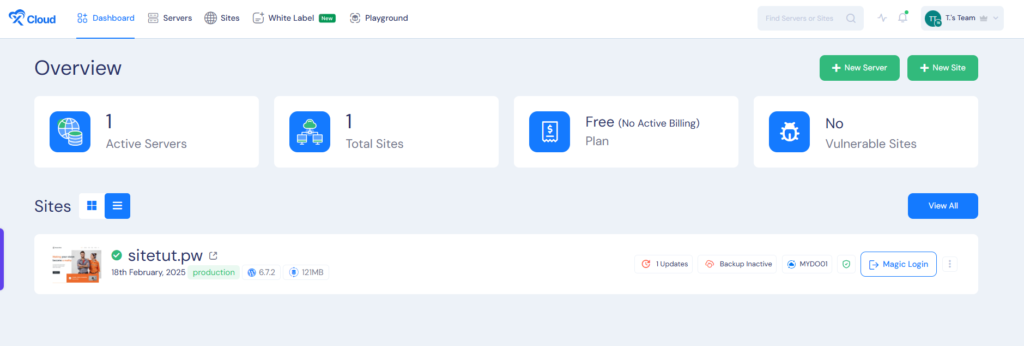
As part of the control panel, xCloud offers managed cloud hosting. Not sure, but I think they’re using Vultr to manage servers. Still, you can integrate a server with any provider and stacks with OpenLiteSpeed or NGINX.
It provides flexible plans. Even though it offers a free plan, it does not include features such as Cloning, Scaling, Backups, Custom NGINX, etc.
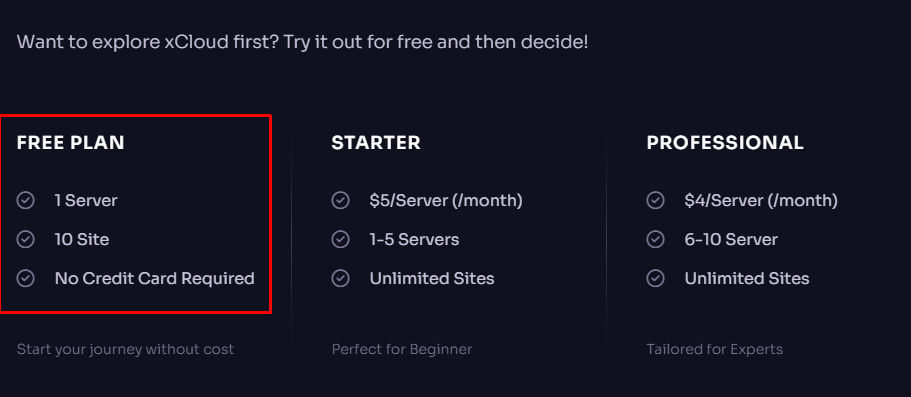
But the free plan lets you have 10 websites on one server. And it’s still valuable for host websites with the latest server stacks and has deeper server control.
Even using a cheap VPS provider like Webdock, I got a decent performance from xCloud. I prefer it over other cloud panels. There are a few reasons for that…
- Compared to Cloudways, you will experience a super-fast control panel that performs like a mobile app.
- The free plan lets me host 10 sites on one server. It’s still valuable for hosting websites with the latest server stacks and control.
- It has an events log, so all the activities happen right in front of my eyes.
- Very easy to log into any site using Magic Login.
- It has a file manager, something that’s missing from most cloud panels.
- I can run automated backups and store them off-site using xCloud’s built-in access to Amazon S3, CloudFlare R2, etc.
- On my xCloud account, I can add other users and remove myself. This will help if you’re a freelancer or service provider.
- I like the “Playground” feature, in which xCloud gives you a temporary domain to make your site live for 24 hours. This way, you can share your progress and make sure it’s good.
Alright, entry-level plan begins at 5 USD/m per server, but if you are handling a lot, you can upgrade to the agency plan for $3 per server.
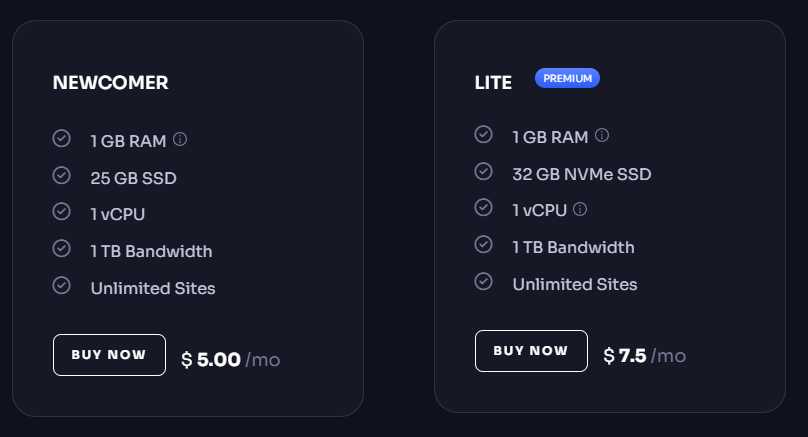
xCloud Managed hosting starts at $5/month. Lite plan offers features such as 1 GB RAM, 25 GB SSD, 1 CPU, 1TB bandwidth, and unlimited sites.
Even with its managed hosting, it is still cheap compared to others. I guess the xCloud premium plans use Vultr high-frequency (powered by Xeon and NVMe ).
So, using Cloudways Vultr‘s high-frequency entry-level plan, you’ll pay 16 USD, but xCloud will charge $7.5. So far, xCloud has received positive reviews on Trustpilot and other platforms. There are some bad ones for terrible support. I’m comfortable with xCloud. Some things are negative as well.
Its biggest problem is the support team’s slow response time. Although xCloud offers live chat, the response time is unacceptable. This isn’t live chat. They will respond to your email later. It’s taking too long to get support tickets.
I don’t recommend xCloud if you need immediate assistance. I know they’re still setting things up, and I’m happy to see things improving.
Pros:
- Tiny file manager.
- Easy one-click login.
- Strong security features.
- Full root access to your server.
- The free plan has enough features, and the paid plans are cheap.
Cons:
- Slow updates on some features.
- Terrible support and payment system.
- A new player – needs time to develop.
- Limited choices of data centers for managed xCloud.
RunCloud

There are a number of new players with modern user interfaces and robust features. And I still think RunCloud is an ideal server management tool for multiple CMSs. But, it’s unlikely to appeal to novice or non-experienced users.
It’s more affordable, has more features with an improved interface, and performs better than most cloud panels. Ideal for development environments.

RunCloud won’t fit entry-level users; it is the most suitable option for professionals. A detailed dashboard allows you to manage servers, websites, and settings.
RunCloud offers LiteSpeed, so it is an ideal LiteSpeed web host. Multiple server stacks for different apps work with any kind of cloud VPS. Price is low; with the Pro plan, you can manage unlimited sites and servers for less than $15 a month.
PRO plan is ideal for anyone who wants to run unlimited websites and servers cheaply, since it costs less than $15/mo.

The support isn’t great. I like the features, but it is a little complicated for beginners. It is more relevant to developers than average website owners.
And I like Ploi.io‘s control panel, which has an advanced UI that can be overwhelming to new users. However, it includes plenty of actual server admin features that make it great for Pure NginX users.
Key Features:
Point is…. RunCloud doesn’t just handle WordPress; it supports most CMSs and frameworks, even custom PHP apps.
The built-in file manager makes it easy to access your application files. Compared with other WordPress cloud hosting control panels like SpinupWP, GridPane, etc., RunCloud is an advanced panel with lots of cool features for coders.
But there is no standard support like Cloudways. They use modern stacks, such as Nginx, OpenLiteSpeed, MariaDB, Redis, etc.
Pros:
- An easy-to-use file manager.
- You can use OpenLiteSpeed.
- Integrated caching: Nginx FastCGI.
- Developer-friendly panel with tons of features.
- Depending on the plan, it offers backup up to 30 GB.
Cons
- No entry-level support.
- Uncomfortable for beginners.
- It’s a bit pricey compared to opponents.
ServerAvatar

An easy-to-use cloud server management panel, ServerAvatar offers modern software and an intuitive interface for managing cloud VPS.
I’d like to compare this to RunCloud, but its UI is more user-friendly and lets you choose any cloud VPS you want. With ServerAvatar’s simple setup, you can install WordPress, Git deployment, Node.js, Joomla, and other PHP apps.
You can try ServerAvatar for free for basic features. The fees are clearly outlined. Starter plans cost $12/M and include all features and up to 5 servers.
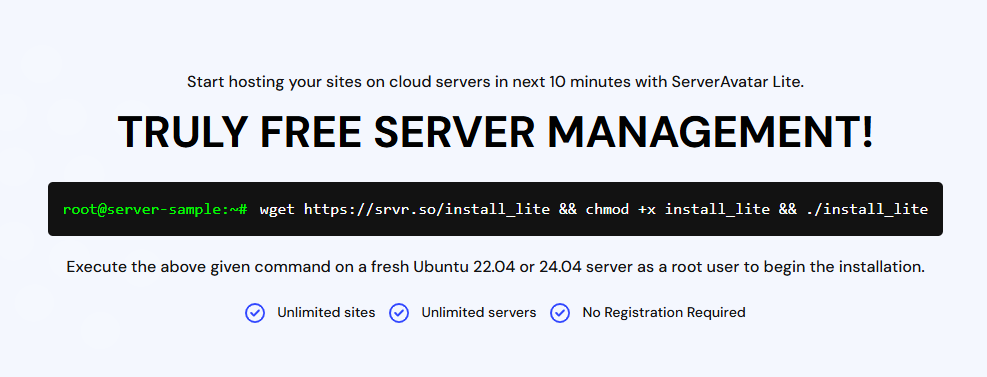
It now has a lite version (free) that you can install on your server. While it’s pretty sound, it still has some bugs, so you shouldn’t use it for serious websites.

However, if you’re an agency or small business, ServerAvatar Pro is ideal at $29 with Team management, Custom roles, Permission management, etc.
Key Features:
ServerAvatar lets you install Apache, NGINX, OpenLiteSpeed, Redis, and MySQL-MariaDB on Linux. It has many security features and you can integrate third-party services like GitHub, Telegram chat, Gitlab, Slack, and Cloudflare.

If you choose the ServerAvatar Pro plan, you can access all of the features with team activities. Ideal solution for agencies managing large servers.
It has a server monitoring tool that shows your server usage in real-time. Supports OpenLiteSpeed and other modern server stacks and includes dev-friendly features with WordPress themes.
ServerAvatar is an Indian-based cloud hosting control panel for WordPress and other PHP apps. Although it lacks several features, the friendly UI and simple pricing structure make it worth testing.
Pros:
- Integrated file manager.
- Single-click staging solution.
- White label for the business plan.
- Multiple security settings for your website.
- Compatible with OpenLiteSpeed and the latest server stacks.
Cons:
- No hybrid stacks like Nginx+Apache.
- It is expensive, and renewal prices can be high.
- Backup is unreliable – you need Google or S3 for remote backup.
SpinupWP

SpinupWP is a cloud host control panel specifically designed for WordPress. Its interface makes it seem that anyone can deploy a server and maintain sites.
But here’s the thing… Prices: I don’t know why they’re charging this much when there are multiple control panels with cheaper options. SpinupWP is ideal for people who need a panel to maintain sites that require minimal maintenance.
You can connect with any VPS or dedicated server with technical integration. The ready-to-use servers from Digital Ocean and Linode make SpinupWP easy for people who like using those.

Despite decent performance, the user interface isn’t ideal due to a lack of a file manager, PHP admin, and other features.
It seems kind of empty in the UI. However, it provides one-click access to the WPlogin and lets you set up your WP Admin link to log users.
Pricing
This panel is way too expensive when compared to alternatives. You can choose between individual and multi-user plans.
The personal plan includes unlimited sites and one server for $12 a month, and each additional server is $5/mo.

The multi-user plan costs $39 monthly, and the site monitoring feature allows you to connect three servers. BUT, you’ll have to pay $7/m for each additional server.
Key Features:
SpinupWP focuses solely on WordPress, and most of its features are designed to fit within its platform. Unlike Cloudways, the dashboard is fast and clutter-free; it gives the impression that hosting a cloud server with WP is as easy. And it doesn’t have advanced features, like a file manager and PHP admin, for security reasons.
Built-in features include server firewall, auto-patch updates, SSL, etc. You can choose a subdomain or subdirectory. Enabling a multisite network is as simple as changing a switch while creating a new site.
It allows full-page caching by using FastCGI. Instead of using cache plugins, the full-page cache can improve your site’s performance.

Since it lacks progressive features, it needs more dev-friendly options. Even the database isn’t easy to find, and setting up cloud servers other than Digital Ocean and Linode takes a lot of work.
If you like DO with pre-installed Nginx+FastCGI, it’s easy to set up. You cannot use LiteSpeed or customized server software. SpinupWP is a reliable WordPress cloud hosting control panel, but developers will not like it because lacks some features.
If you prefer a simple and clean control panel with NGINX configurations on a cloud host like DigitalOcean, try this. The pricing works fine for a couple of servers, but it is expensive for multiple servers.
Pros:
- You get full root access.
- Built-in server-side caching.
- WordPress-specific features.
- One-click WordPress admin login.
- Uncluttered and easy to use panel.
Cons:
- It’s insanely expensive.
- Incompatible with LiteSpeed.
- Lacks many advanced features.
- Difficult to set up cloud servers except for Digital Ocean.
Cloudways

Cloudways is a popular managed cloud hosting control panel for various apps. With most other cloud panels, you can choose any cloud server, database, caching option, or web server, but Cloudways has limited customization options.
Support is better than other panels; you can ask questions anytime. But it’s never been a favorite of mine. Actually, it’s not a control panel; it’s a managed cloud hosting service, but you can see how a typical control panel works.
Cloudways isn’t the best or cheapest, but it has the features you’ll need. It has had its ups and downs since being acquired by DigitalOcean, but it remains reliable.
Since it is pre-configured with Nginx and Apache stacks, users cannot choose a server like LiteSpeed, and you can’t use any VPS or dedicated server.
Key Features:
Cloudways discontinued Linode and Vultr services after being acquired by DigitalOcean, but recently added them back. With pre-setup apps, you can only get Vultr, Linode, DigitalOcean, AWS, and Google Cloud.

They offer the Cloudflare Enterprise package as a paid CDN service ($5 for one site). It has features like full-page caching, Argo, image optimization, etc.
An average site can get quick page loads and good TTFB. However, Cloudflare Enterprise can be used more effectively with FlyingCDN or Rocket.net. Cloudways offers built-in caching options, such as Memcached, Varnish, Redis free, and Pro.
You can move servers between accounts. Cloudways doesn’t include a file manager, so you’ll need an external one like Tiny File Manager or FileZilla. Most cloud panels use this approach.

Breeze is Cloudways’ cache plugin for WordPress. It can help with the CW server setting; however, I suggest you use FlyingPress instead of Breeze.
Prices:
Prices at Cloudways are twice or three times higher than at the provider. For example, Linode’s entry-level plan is $5, but these guys charge $14. HAHA!
So, it’s not a good choice for online stores or traffic-heavy sites. If you use only 1 GB of RAM and one core, the monthly cost will be less than $15. What’s the point of using this platform when there are better ones?
| Provider | First Plan Prices | RAM | CPU | Bandwidth |
|---|---|---|---|---|
| DigitalOcean | $11 | 1 GB | 1 Core | 1 TB |
| DO Premium | $14 | 1 GB | 1 Core | 1 TB |
| Vultr | $14 | 1 GB | 1 Core | 1 TB |
| Vultr HF | $16 | 1 GB | 1 Core | 1 TB |
| Linode | $14 | 1 GB | 1 Core | 1 TB |
| AWS | $38.56 | 2 GB | 2 Core | 2 GB |
| Google Cloud | $37.45 | 1.75 GB | 1 Core | 2 GB |
AWS and Google Cloud prices depend on your bandwidth. You’ll be charged more if you use more (the default bandwidth is 2 GB).
Pros:
- Free Object Cache Pro.
- You can switch servers between accounts.
- Share server access with teammates or customers.
- Full-page caching with the Cloudflare Enterprise Addon (PAID).
Cons:
- It’s insanely expensive.
- It doesn’t include a file manager.
- Limited customization capabilities.
- The dashboard runs slowly, still under development.
- Some customers have to go through a verification process.
SPanel

SPanel is an enterprise-level web server control panel and an ideal alternative to cPanel. It can also be used if you manage multiple sites/servers and need better pricing and performance. Support any hosting provider with APIs.

It offers two kinds of pricing: fully managed and self-managed. Self-managed is a cost-effective option for users who like to handle things themselves. First plan starts at $10, and you can have up to 5 accounts.

Fully managed service includes technical support for server and account issues. SPanel’s live chat lets you connect with a technician instantly. It starts at $20 for up to 5 accounts. It’s cheaper since the price is based on accounts, not servers.
Key Features:
SPanel has some unique features that make it different from other managed cloud hosting panels. You can add additional users to the admin interface and set their access levels—restrict each user’s access to certain features.
Spanel is integrated with Softaculous Installer so that you can set up WordPress, Drupal, OpenCart, and various other web applications. Users can manage all their email accounts with automatic replies and filtering options.
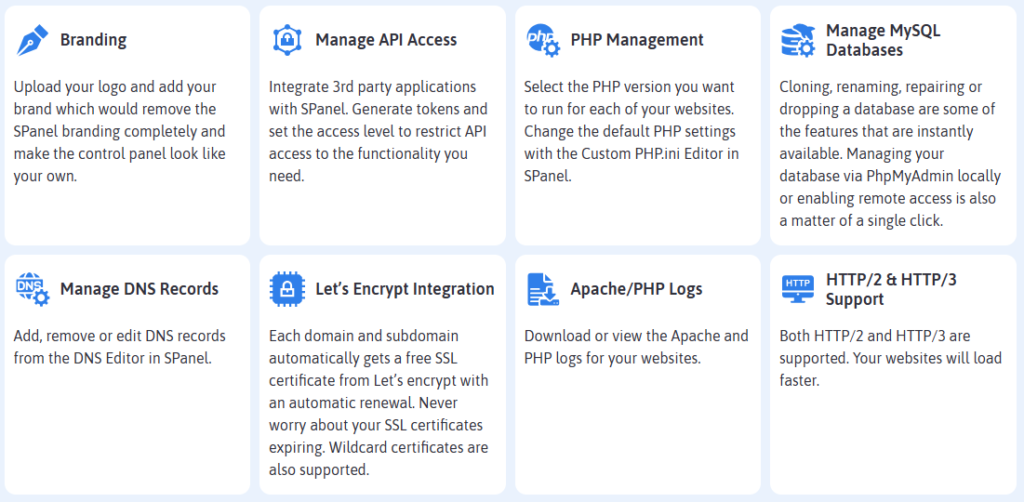
Moreover, it supports a white label, allowing you to upload your logo, add your brand to the control panel, and remove the SPanel branding altogether.
SPanel is definitely not for people who like easy-to-use panels like SpinupWP. I think it’s ideally suited for people who want advanced stuff and need to manage many servers or agencies. Also cheaper than Plesk or cPanel.
Pros:
- Softaculous auto installer.
- You can get a fully managed service.
- Manage email boxes for all your domains.
- A lot of dev-friendly features with root access.
- Use free OpenLiteSpeed or your enterprise version.
Cons
- A complicated user interface.
- It is not intuitive for a beginner to use.
To Wrap It Up
Cloud hosting control panels like RunCloud, xCloud, ServerPilot, etc., are suitable for site owners or freelancers who want to host websites in a safe environment.
ClusterCS and Ploi.io are advanced server management systems that you can use to do more than WordPress. You can host WordPress with popular hosting control panels, such as Plesk, SPanel, GridPane, etc. These are primarily for enterprise levels. Each has a significant user base but lacks the creativity to make changes.
Most cloud server management platforms are designed for users seeking cheap, high-performance hosting with the benefits of VPS or dedicated servers.
Cloud VPS is suitable for heavy sites like WordPress documentation. Compared to shared hosts, VPSs are faster because they give you more resources.
If you have many clients or servers, you should use a solid control panel. A cloud server with a solid admin panel can benefit even small websites.
Read More: Copy Text From Protected Websites Online.


